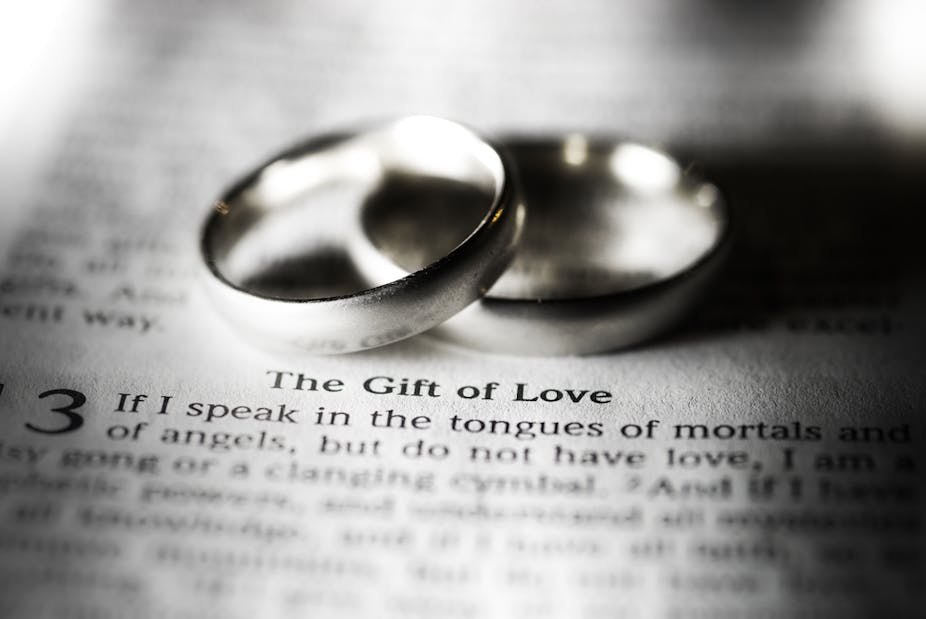As debate about marriage equality escalates in light of the postal survey, there is much discussion about religious freedom and the potential effect on organised religion. But what exactly would change for Christian churches should the federal government revise the definition of marriage?
In short, nothing. Religious organisations have freedom under Australian law to practice their own doctrines and marriage rituals for weddings held in their buildings and by their celebrants. This applies to all religions, although the focus in this piece will be on Christianity.
Further reading: To Christians arguing ‘no’ on marriage equality: the Bible is not decisive
Religious celebrants are authorised to marry through their churches or religious organisations, and can only do so according to those organisation’s respective policies.
This is a separate process to the accreditation of civil celebrants. For example, I, as an ordained Uniting Church minister, will not be able to marry same-sex couples even if the civil law changes, unless my church also chooses to change its policy, which it has no compulsion to do.
Currently, to be married in an Anglican church, at least one of the couple to be married must be a baptised Christian.
To be married in the Roman Catholic Church, neither partner can be previously married and divorced. Even when no-fault divorce was introduced in secular law in 1975, the Catholic Church continued to uphold its own view regarding divorce. This remains the case.
The Greek Orthodox Church usually requires the couple to be baptised in the Orthodox tradition, but occasionally allows one of the pair to be of another Christian denomination as long as they were not baptised by a female minister.
Similarly, some synagogues require both parties to show proof they are Jewish, while others might allow an interfaith marriage.
Apart from official church polity, clergy are also permitted to exercise their own discretion when it comes to marriage. Hence, if one thinks the couple is too young, not prepared, has rushed into the decision, or suspects any kind of abuse, they can refuse to marry them or require them to undergo counselling or something similar beforehand.
Such discretion is protected by the religious freedoms granted to clergy.
Further reading: Without proper protections, same-sex marriage will discriminate against conscientious objectors
Recently we witnessed the case of a Victorian Presbyterian minister who refused to marry a couple because of their views on marriage equality. While I disagree with the decision of the clergyman in question, he is free to refuse on these grounds.
His protection under Australian law is assured – a fact supported by Prime Minister Malcolm Turnbull, who said:
… churches are entitled to marry or not marry whom they please. That is part of religious freedom.
Australian civil marriage laws have changed several times in the last 120 years, and each time religious organisations have been free to conduct marriages according to their traditions.
Further reading: Breaking news: marriage has very little to do with religion (and vice versa)
While nothing will have to change for the church and therefore there is nothing to fear from a change to civil law, religious organisations are faced with a new opportunity should civil law change. It is an invitation to revisit their marriage policies and consider whether or not they want to extend their respective religious marriages to same-sex couples.
After same-sex marriage was legalised in the US, two Christian churches did exactly that. In 2015 the Episcopal Church’s General Assembly gave permission for clergy to officiate over same-sex weddings at the discretion of the regional bishop and according to their own conscience.
No clergyperson was forced to do so – the change in policy was permissive rather than prescriptive.
That same year, the US Presbyterian Church also amended its marriage policy to affirm that marriage is a “unique commitment between two people, traditionally a man and a woman, to love and support each other for the rest of their lives”. The policy gives permission for Presbyterian clergy to marry same-sex couples but clearly states that no clergyperson could be compelled to perform same-sex marriages.
These are just two examples of many around the world, although Christian churches who marry same-sex couples are still the minority within the global Christian tradition.
Concerns over religious freedom cannot be dismissed too lightly, but neither should they be overstated. The dynamics described above are different when is comes to individuals working in the secular space or organisations such as religious private schools.
What is clear, however, is that no one can compel any official church leader in Australia to perform marriages against its own policy, and no church will be forced to change its current marriage policy, rituals or doctrines.
I hope, however, that some churches might embrace the possibility of extending the blessings of a Christian marriage to all committed couples.

